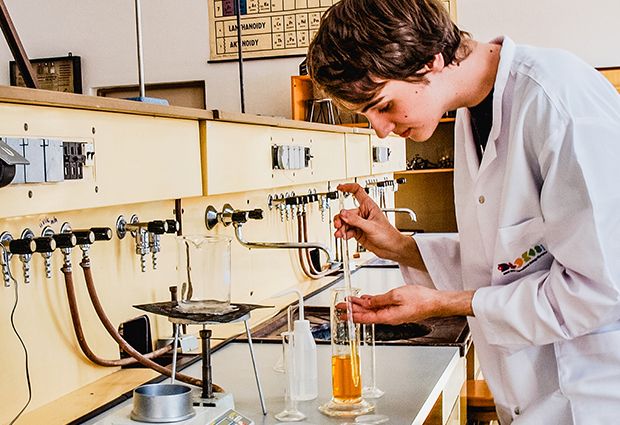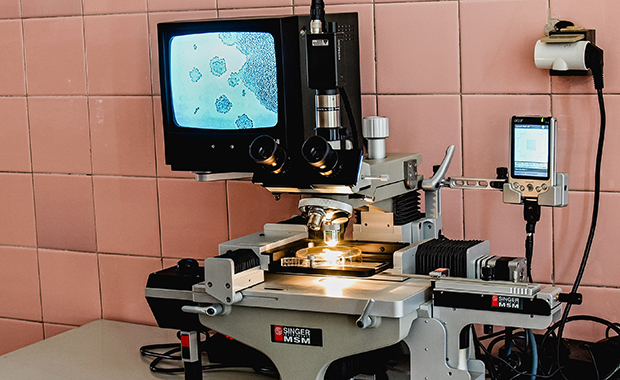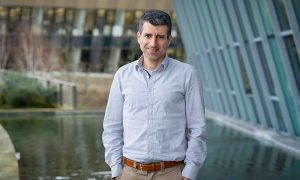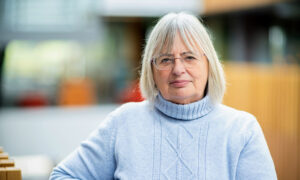
The germ of a network biologist
Lukáš Janošík, a winner in last year’s European Union Contest of Young Scientists (EUCYS), visited EMBL Heidelberg for one week in June. Here he shares his research interests and reveals his path to earning such a prestigious award at such an early age.

“Interactions: that’s what I like the most in biology,” says Janošík, turning his head from his laptop screen that displays a powerpoint full of graphs and microscopy images. He is 19, from Slovakia, and obtained the special prize in molecular and cellular biology at EUCYS 2014, a distinguished annual competition between hundreds of candidates from across Europe. The award recognised his research on mitochondrial DNA stabilisation, which Janošík explains enthusiastically.

Mitochondria are the energy factories of eukaryotic cells (in humans and all animals, plants, mushrooms and many microorganisms). These organelles keep their own DNA, which encodes mitochondrial proteins – in the first steps of evolution, mitochondria were autonomous bacteria that got engulfed inside other cells and remained there. Growing research highlights that mitochondrial dysfunction is an underlying cause in several human diseases. During a summer spent at Comenius University in Bratislava, Janošík investigated a protein that packages mitochondrial DNA in yeast, and found that, strikingly considering its critical function, yeast lives longer when this protein is lacking. Janošík thinks that this reflects the activation of a defence response to stress, to counteract the accumulation of miss-folded proteins. “When this protein is lacking, other non-mitochondrial proteins with which it interacts begin to accumulate in a miss-folded state,” he explains. “This triggers the production of molecular chaperones –proteins that help other proteins to fold correctly – and proteases that destroy miss-folded proteins and protect from oxidative stress. Thus, aging processes are slowed, and that might explain why longevity is extended.”

Every year, the winner of the EUCYS competition visits EMBL to experience the laboratory, its facilities and international environment first hand. During his visit, Janošík met several group leaders, postdocs and PhD students: “EMBL is amazing, I would love to do my PhD here,” he says. The prize-winner’s visit is timed to coincide with an event at EMBL’s Advanced Training Centre, and so Janošík had the opportunity to attend his first scientific conference, the EMBO/EMBL symposia ‘Mechanisms of Neurodegeneration’. Although far from his area of expertise, Janošík wasted no time in finding a potential link with his previous research: “Some talks and posters suggested that the very same defensive mechanism I think has increased yeast longevity in my experiments may also have a role in the progression of Alzheimer’s disease,” he says.
EMBL is amazing, I’d love to do my PhD here
Janošík has an insatiable curiosity that extends far beyond mitochondrial DNA. He is also fascinated by the world of orchids and their evolution and ecological relationships with other species. “Orchids and bees have co-evolved to the extent that only certain species of bee pollinate certain species of orchid,” he explains. Orchid diversity and extinction risk in Europe was the topic of his very first science-related success years ago: together with his sister, he prepared a project that won a local science competition. Janošík has gone on to receive awards at other local and national science contests in Slovakia, and international competitions such as the Intel International Science and Engineer Fair and the International Biology Olympiad.
Janošík is keeping his options open for the future: “Right now, I want to confirm my hypothesis and investigate the molecular mechanism causing the increased yeast longevity I observed,” he says. Then, he will enroll at the Charles University in Prague to study Biology. It’s not hard to imagine him returning to EMBL in a few years, presenting new, fascinating and outstanding research as an established life scientist.


